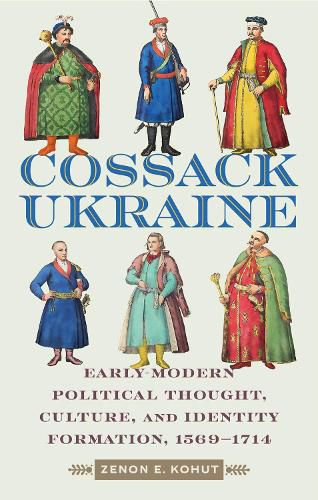Readings Newsletter
Become a Readings Member to make your shopping experience even easier.
Sign in or sign up for free!
You’re not far away from qualifying for FREE standard shipping within Australia
You’ve qualified for FREE standard shipping within Australia
The cart is loading…






Both modern Ukrainian nationhood and the historical preconditions of the country's contemporary conflict with Russia are rooted in a complex period of development in Cossack Ukraine. Cossack Ukraine traces the evolution of early modern Ukrainian political thought and culture from their sixteenth-century origins to 1714.
Early modern Ukraine was home to a multitude of interrelated political cultures, including those of the Ruthenian nobility, the Kyivan clergy, and the Cossacks. Zenon Kohut shows how constant interplay between these cultures contributed to the development of political, territorial, religious, ethnic, and national collective visions that reflected early modern concepts of nation, state, and identity. Two persistent narratives - the idea of Ukrainian autonomy and perpetual rights, and the idea of a continuous "Russian" tsardom stemming from medieval times - formed the foundation for not only Ukrainian state- and nation-building but also Russia's modern identity and sense of nationhood, creating the ideological underpinning for Russian imperialism.
Based in a classical analysis of ethnic, religious, and political ideas developed by early modern Ukrainian intellectuals, The Making of Cossack Ukraine brings to light the origins of present-day Ukrainian political thought.
$9.00 standard shipping within Australia
FREE standard shipping within Australia for orders over $100.00
Express & International shipping calculated at checkout
Both modern Ukrainian nationhood and the historical preconditions of the country's contemporary conflict with Russia are rooted in a complex period of development in Cossack Ukraine. Cossack Ukraine traces the evolution of early modern Ukrainian political thought and culture from their sixteenth-century origins to 1714.
Early modern Ukraine was home to a multitude of interrelated political cultures, including those of the Ruthenian nobility, the Kyivan clergy, and the Cossacks. Zenon Kohut shows how constant interplay between these cultures contributed to the development of political, territorial, religious, ethnic, and national collective visions that reflected early modern concepts of nation, state, and identity. Two persistent narratives - the idea of Ukrainian autonomy and perpetual rights, and the idea of a continuous "Russian" tsardom stemming from medieval times - formed the foundation for not only Ukrainian state- and nation-building but also Russia's modern identity and sense of nationhood, creating the ideological underpinning for Russian imperialism.
Based in a classical analysis of ethnic, religious, and political ideas developed by early modern Ukrainian intellectuals, The Making of Cossack Ukraine brings to light the origins of present-day Ukrainian political thought.